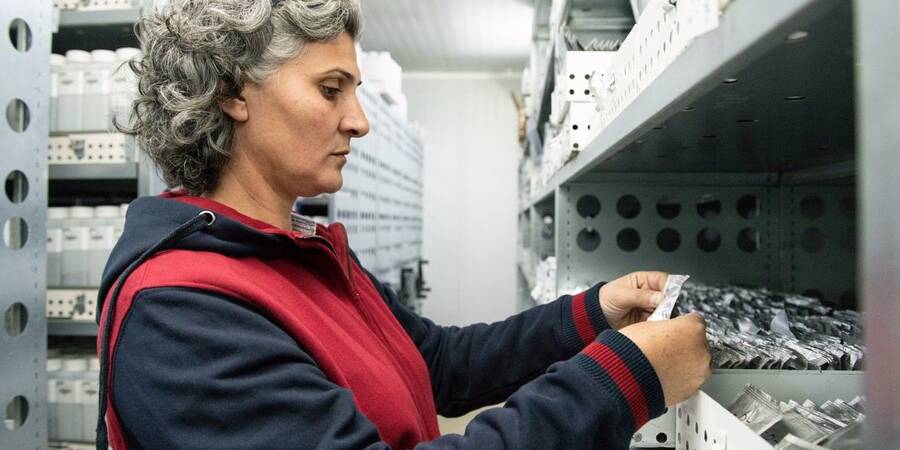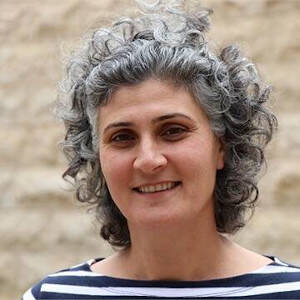Q&A with Mariana Yazbek

- Women in science, including in the field of agricultural research for development, are underrepresented compared to their male peers. How do you explain this, and in your view how can the balance be reestablished?
MY: Women scientists are underrepresented across the board, but even more so in disciplines that are perceived as requiring more physical strength, like agricultural research. I think this might be a little bit cultural in this part of the world, which is ironic because in the Middle East and across Africa, there are more women working as farmers than men. But when it comes to research, the male/female ratio switches.
I think it starts early on, at school where there is a cultural expectation of what girls and boys should be learning. Overwhelmingly, boys are encouraged to go into sciences, and girls into humanities. This creates a vicious cycle because if you do not empower girls in certain fields early on, they are less represented, and must fight harder later. I think this gender imbalance can also be a result of the lack of role models for female scientists, particularly in agricultural sciences.
- Globally, there does not seem to be a major issue around training women scientists, but rather to recruit them, and then retain them in scientific professions. Why is that, according to you, and how do you think we could stem this loss of trained womanpower?
MY: I believe that discrimination in hiring women in some sectors is prevalent. It can be unconscious, or overt. I have experienced it first-hand during an interview I had early on in my career. I was interviewed by a committee of two men, and a woman manager. I was told after I was hired that one of the men did not want to hire me simply because I am a woman. He expressed doubts on my ability to conduct fieldwork and talk to remote farming communities. I got the job because the female manager did not discriminate, and I was the best fit for the position. Therefore, we need more women in senior positions to lead the way for other women. But we also need this process to be made more systemic, and not left to chance like in my case.
Another issue is that when women have a family, especially a baby, they often do not find much support. Even if their partner is actively engaged in family life, and hands-on about his responsibilities towards the child, the physical burden of carrying a baby, delivering it, and breastfeeding it, rest solely on the woman. I have many women in my team, and based of my own experience, I can support them better because I am fully aware of the physical and emotional toll it can take.
ICARDA as an organization does a good job at supporting women, but other places do not. Incredible as it may sound, ways can be, and are, found to lay off women when pregnant, or not hire them in the first place because the management assumes that they will have a baby at some point. This is discrimination, plain and simple.
- In what ways would a larger representation of female agricultural scientists improve the research into better livelihoods for rural women?
MY: In many cultures and settings, female farmers are simply not seen, nor heard by their husbands or their male family members. They are just labor, without recognition for their work, and have no say in important decisions related to the farm work. When a visiting researcher is male, the male farmers will not allow their female relatives to be present, and the interactions will solely occur between men. As a result, the female point of view will not be recorded. Yet she is a huge part of the farm, so from a science standpoint, the data collected will be incomplete, and any research conclusions uninformed.
But when a women researcher is visiting a village, she will speak to the male farmers, and then the male farmers will push the women at the front because they assume that a woman can interact with another woman. That way, we are able to capture female voices as well, understand their work, their challenges, opportunities, and the trade-offs they must make. And the research picture formed is complete for men and women.

- You were born in a farming family, and you now manage ICARDA’s International Genebank in Lebanon. Please tell us that story?
MY: I come from a village in Lebanon, and my parents are farmers. My father decided to enroll me at the American University in Beirut, the most expensive university in the country. When money for tuition ran out in my third year, he sold a piece of land to ensure I could finish my degree. For any farmer’s family, selling a piece of land is a huge deal, especially to fund a girl’s education. My father’s decision created a fuss within my own family. My aunt, who is a strong and wise matriarch, declared that selling land for a boy’s education could possibly be acceptable, but not for a girl. She argued that it does not make sense to sell land so one could learn agriculture at university, and that my father should give me that land instead for me to learn the ropes. Somehow, she had a point!
But seriously, none of my career would have happened had my father not placed that much trust in me. I had huge incentive to succeed and excel, because I was the reason my family lost a piece of land. So, I worked very hard. In my society, just like anywhere, education is the best way to move from one socio-economic class to the next, which is why my father took that decision. He did not want me to be a farmer, he wanted something else for me. A couple of years ago, I bought a piece of land, which feels like the best thing I have done in my life.
- What achievement at ICARDA are you most proud of?
MY: I was tasked with building a whole Genebank system in Lebanon to safely store the seeds that had been sent to Norway for safekeeping after the war broke out in Syria. It was a formidable task. At the beginning we had no team, no facility, and no genetic material. I was hired to oversee the construction of the entire Genebank, recruit a team, and rebuild ICARDA’s seed collection from scratch.
In 2014, the ICARDA seeds began arriving from Norway, and as a team, we sweated blood and guts for five years to get the Genebank up and running. We stopped being just agricultural scientists. We became architects, engineers, and interior designers. Today, ICARDA has a fully-fledged Genebank in Lebanon that functions with international standards. Together with our Genebank in Morocco, ICARDA’s Genebank system holds over 140,000 unique plant accessions, many of which are wild relatives of important crop species found in Lebanon, some extinct in the wild. I am ready to retire, I have already worked two lifetimes!
------------

Mariana Yazbek is a Lebanese national, holds a PhD in Botany from Cornell University. After graduating with a bachelor’s degree in agriculture and progressing in her work experience, Mariana decided to lead a carrier in science when she noticed that every time there was a national need for a plant taxonomist, expertise was invited from abroad. Building national capacities in science was a major drive for her. She is currently an ICARDA Scientist managing the Genebank in Lebanon (curating the rich and unique Crop Wild Relatives collection originating in the Fertile Crescent), a member of the Executive Committee of the CGIAR Genebank Platform and acts as a co-chair of the IUCN Species Survival Commission - Crop Wild Relative Specialist Group. Her research focuses on ex -situ and in situ conservation of Agrobiodiversity.
